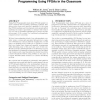Free Online Productivity Tools
i2Speak
i2Symbol
i2OCR
iTex2Img
iWeb2Print
iWeb2Shot
i2Type
iPdf2Split
iPdf2Merge
i2Bopomofo
i2Arabic
i2Style
i2Image
i2PDF
iLatex2Rtf
Sci2ools
142
click to vote
ACMSE
2011
ACM
2011
ACM
Integrating digital logic design and assembly programming using FPGAs in the classroom
Rising Field Programmable Gate Array (FPGA) market volumes combined with increasing industrial popularity have driven prices down and improved capability to the point that FPGA hardware and development environments afford academia the unique opportunity to embrace this technology not only in specialized graduate-level courses, but also across many of the courses of a traditional undergraduate computer science curriculum. We have begun adapting several of our undergraduate computer science courses and associated laboratories to make use of FPGAs as a common platform of instruction. In this paper, we illustrate how to make use of FPGAs in courses that cover digital logic design and assembly programming while discussing some of the pro’s and con’s of their use. We also provide a detailed discussion of a laboratory project that integrates both assembly programming as well as digital logic design in such a way that allows the student to perform a trade-off analysis between using soft...
ACMSE 2011 | Computer Science Curriculum | Digital Logic Design | Programmable Gate Array | Theoretical Computer Science |
Related Content
| Added | 12 Dec 2011 |
| Updated | 12 Dec 2011 |
| Type | Journal |
| Year | 2011 |
| Where | ACMSE |
| Authors | William M. Jones, D. Brian Larkins |
Comments (0)

